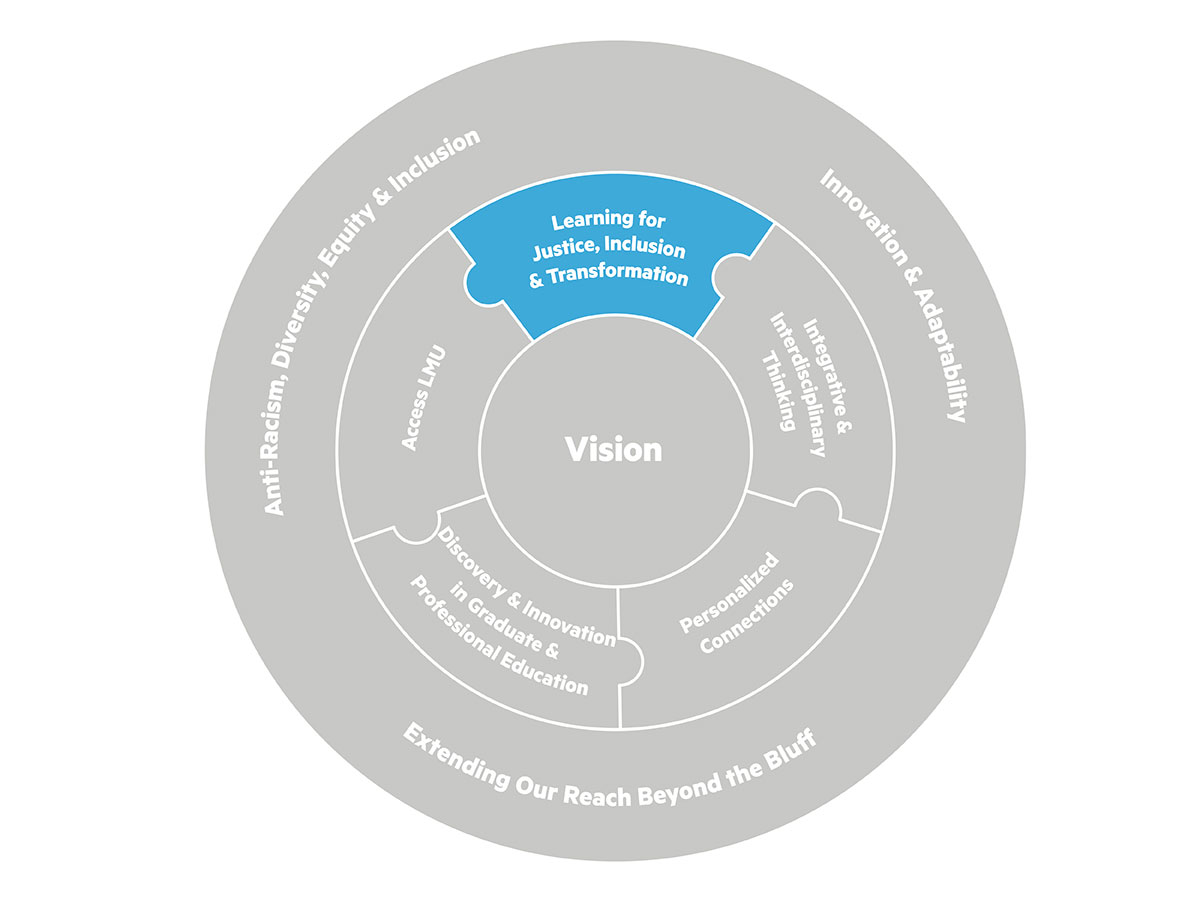Goal
LMU will transform its academic and student life experience to embrace anti-oppressive curricular, co-curricular, and pedagogical practices, grounded in a commitment to diversity, equity, and inclusion as defining features of an LMU education.

Rationale and Strategic Approach
LMU's educational vision embraces anti-oppressive pedagogies, including anti-racist approaches, and seeks to expand understandings of academic excellence and student success to be more inclusive and justice oriented. Informed by our liberal arts foundation and our commitment to human dignity and whole-person education, we will offer strong and challenging academic and co-curricular programs that address issues of identity and difference – and their consequences at multiple levels – as well as broaden our students' global horizons. Our Catholic mission and commitment to justice motivates us to pursue equity and inclusion for all students and to seek to overcome systemic racism and other forms of historical exclusion and marginalization and their impacts on our students. We believe that diversity enhances human creativity, inclusion enriches personal thriving and interpersonal engagement, and equity-mindedness enables social transformation. Students who experience a diverse, inclusive, equitable, and anti-racist learning environment are more likely to acquire the distinctive insights, cultural competencies, and value commitments needed to address the world's most challenging problems. By spotlighting an initiative to enhance these practices and to recruit and retain the students, faculty, staff, and administrative leaders needed to ensure success, we can collectively fulfill the rich promise of an LMU education.
-
Actions
- Review and revise core curriculum and major/minor curricula to directly address racism and other forms of oppression and exclusion, and to increase awareness and engagement with the resulting impacts on academic disciplines, cultural presuppositions, and social structures.
- Review and enhance professional development strategies that support and encourage inclusive pedagogies (for example, universal design for learning (UDL), anti-oppressive teaching and pedagogical practices, etc.) that enhance educational effectiveness for all learners, including persons with disabilities.
- Support faculty research/creative work and faculty-student academic mentoring in areas related to anti-racism and DEI-oriented learning.
- Design a plan to increase coordinated curricular/co-curricular engagement with challenging issues related to diversity, equity, inclusion, including consideration of an anti-racism engaged learning-experience requirement.
- Support student life programs and initiatives that promote diversity, equity, and inclusion (for example, restorative justice practices).
-
Actions
- Set clear expectations and metrics for success in recruitment and retention of faculty, staff, and administrative leaders from historically underrepresented and marginalized groups, and align hiring practices and faculty/staff support structures to ensure success.
- For faculty, recognize and reward forms of teaching, research, and service that promote diversity, equity, and inclusion, including curriculum transformation and recognition of "informal/invisible" service; for staff, recognized DEI-related service that contributes to co-curricular educational objectives as a valued element of performance reviews.
- Review departmental tenure and promotion standards and merit review processes for faculty and staff and propose revised standards that recognize a broad range of expressions of excellence in scholarship, teaching, and service in ways that are inclusive and academically sound.
- Examine formal and informal structures for mentoring, support, and thriving of faculty and educational staff, and devise a plan to improve support structures, as appropriate to each area, throughout their careers.
- Pursue fundraising opportunities for initiatives that contribute to diversifying the faculty.
-
Actions
- Set clear expectations for success in student recruitment and retention for historically underrepresented and marginalized groups.
- Strengthen pathways and infrastructure for recruiting students from historically underrepresented and marginalized groups to attend LMU.
- Increase funding to support and develop curricular and co-curricular programs and initiatives that positively impact the student experience, retention, persistence, and graduation of students from historically underrepresented and marginalized groups.
- Evaluate current access to high-impact learning opportunities such as study abroad, internships, and undergraduate research, and devise a plan that increases access for historically underrepresented and marginalized groups.
- Pursue fundraising opportunities for scholarships that support the recruitment and retention of a diverse student body.